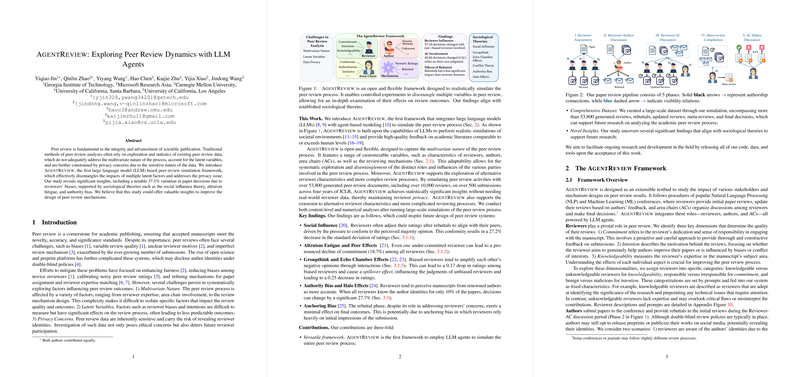AgentReview: Exploring Peer Review Dynamics with LLM Agents
"AgentReview: Exploring Peer Review Dynamics with LLM Agents" introduces an innovative framework leveraging LLMs to simulate and analyze peer review processes. This work aims to address the inherent complexities and privacy concerns involved in traditional peer review analyses by introducing a synthetic, controlled, and privacy-preserving simulation environment. The paper primarily explores the roles of various latent factors influencing peer review outcomes, such as reviewer biases, commitment, and knowledgeability, as well as the impact of area chairs' decision-making strategies and the influence of author anonymity.
Framework Overview
AgentReview employs a structured five-phase pipeline to simulate the peer review process, closely mirroring procedures used in large conferences like ICLR. The phases include initial reviewer assessment, author-rebuttal interaction, reviewer-area chair (AC) discussions, meta-review compilation, and final decision making. By integrating LLMs to simulate the roles of reviewers, authors, and ACs, AgentReview creates a comprehensive and adjustable environment to examine various facets of the peer review process.
The framework incorporates agent-based modeling to emulate real-world behaviors and interactions among stakeholders while preserving synthetic data's flexibility and ethical viability. This approach allows for the manipulation and isolation of specific variables, providing a detailed understanding of their influence on review outcomes.
Key Findings
The authors present several key findings from their simulations:
- Social Influence: The tendency for reviewers to conform to the majority opinion during discussions, leading to a 27.2% decrease in the standard deviation of ratings.
- Altruism Fatigue: The presence of at least one irresponsible reviewer can lead to an 18.7% decline in the overall commitment of the reviewer panel.
- Groupthink and Echo Chamber: Biased reviewers amplify each other's opinions, causing a decline in overall ratings (0.17 among the biased reviewers). This collective bias can spill over and affect the assessments of unbiased reviewers, leading to a 0.25 decrease in ratings.
- Authority Bias and Halo Effects: When reviewers are aware of the author identities, especially those renowned in the field, decisions can shift significantly by 27.7%.
- Anchoring Bias: The initial impressions formed during the first submission heavily influence the reviewers' final judgments, making the rebuttal phase's impact minimal.
Practical and Theoretical Implications
The practical implications of this research are significant. By disentangling the various factors influencing peer review outcomes, AgentReview provides actionable insights to improve peer review mechanisms.
- For Reviewers: Understanding the impact of biases and commitment levels can lead to better training and selection processes.
- For Conferences and Journals: Insights into how reviewer anonymity and AC strategies influence decisions help in designing more robust and fair review protocols.
- For Authors: The minimal effect of rebuttals underlines the importance of strong initial submissions and may prompt revisions in how rebuttals are structured and evaluated.
Theoretically, AgentReview opens new avenues for research in the sociology of scientific knowledge, institutional bias, and decision-making processes. The framework also lays the groundwork for future studies exploring more nuanced and complex interactions within peer review systems.
Future Developments in AI
Looking ahead, further developments in AI could enhance the realism and utility of simulations like AgentReview. Improved LLMs with more advanced capabilities in understanding and generating nuanced feedback could make simulations even more accurate. Additionally, integrating empirical validation mechanisms where LLMs can adjust experiments based on feedback could bring simulations closer to real-world dynamics. The advancement in LLMs might also facilitate the automation of specific peer review stages, thereby reducing the workload on human reviewers while maintaining high review standards.
Conclusion
"AgentReview: Exploring Peer Review Dynamics with LLM Agents" represents a significant step forward in the analysis and design of peer review systems. By leveraging the capabilities of LLMs and agent-based modeling, this framework provides a detailed, privacy-conscious, and flexible platform to explore the complexities and latent factors influencing peer reviews. The findings underscore the impact of reviewer biases, commitment, and anonymity, along with the role of ACs, offering valuable insights for improving the fairness and effectiveness of peer review processes. Future research and developments in AI promise to further refine and expand the capabilities of AgentReview, contributing to more robust and equitable scientific publishing practices.
